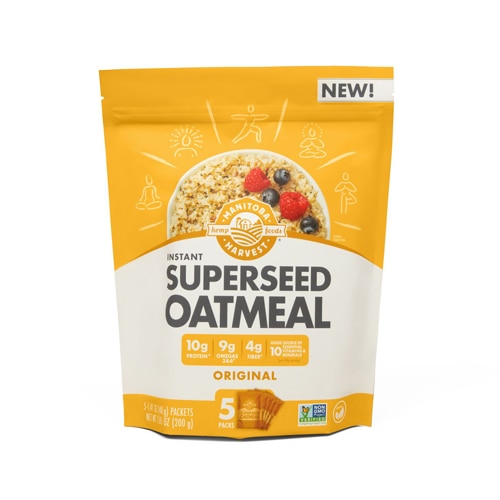[vc_row][vc_column][vc_column_text]Chronic diseases like
heart disease and diabetes cause nearly 800,000 deaths per year and are responsible for over $650 billion in
medical costs. But cultivating a diverse gut microbiome through diet may be a key factor in reducing your risk of developing these conditions.

That's the goal of the MAC diet, a dietary pattern that aims to support a healthy gut environment and prevent the growth of microbes associated with disease. Short for "microbiota-accessible carbohydrate diet," the MAC diet focuses on increasing fiber intake to feed beneficial microbes in the gut.
What is the MAC diet? Prebiotic fiber explained
Not all the carbohydrates you eat actually reach your microbiome. The carbohydrates in low-fiber refined foods like white bread are
mostly digested and absorbed before they leave the small intestine. Complex carbohydrates like those in whole grains, fruits, vegetables and
beans contain
prebiotic fiber that resists digestion and passes into the colon, where gut microbes break it down into byproducts called metabolites. Also called
postbiotics, many of these compounds have been shown to directly affect health.
On the MAC diet, you follow a few basic principles to increase complex carbohydrate intake and support a healthy microbiome:
- Avoid ultra-processed foods, including refined carbohydrates
- Reduce or eliminate food additives, added sugars and unhealthy fats
- Replace animal proteins with plant proteins like legumes, tofu, and tempeh
- Eat more vegetables, fruits, whole grains, nuts and seeds
These principles aren't new: Doctors like Dean Ornish,
T. Colin Campbell,
Joel Fuhrman,
Neal Barnard and
Michael Greger have been pointing to the benefits of whole and minimally processed plant foods for decades. Other dietary patterns commonly recommended to reduce disease risk, such as the
Mediterranean Diet and the
DASH Diet, also emphasize whole foods, plant proteins and healthy fats. But only in recent years has research shown that the microbiome may be one mechanism behind the health benefits of these foods.
How do prebiotics in the MAC diet improve gut health?
Your gut microbiome consists of thousands of microbes like bacteria, viruses, fungi and yeast. They constantly interact with the gut environment, the food you eat—and each other.
In a healthy gut, beneficial microbes keep disease-causing microbes in check. But factors like diet—along with exercise, stress, illness and sleep patterns—can disrupt the balance and allow disease-causing microbes to flourish. Known as dysbiosis, this
imbalance between good and bad microbes is found in conjunction with numerous diseases.
A gut out of balance: The dangers of dysbiosis
In a dysbiotic microbiome, some types of microbes produce metabolites that may promote chronic conditions, including:
Restoring gut microbiome balance with dietary fiber
The prebiotic fibers that dominate the MAC diet can shift the balance of microbes in your gut to reduce disease-causing species and allow good bacteria to regain dominance. It may also increase microbial diversity and richness: the number of species and the total number of microbes in your gut.
Both richness and diversity are associated with lower disease risk, likely due to the metabolites that beneficial microbes produce. These include:
- Short-chain fatty acids (SCFAs), compounds that protect gut cells from damage and promote the production of the protective mucus layer that lines the gut wall. SCFAs have also been shown to support healthy immune responses, reduce inflammation and support metabolic functions that reduce fat storage and increase energy expenditure.
- Exopolysaccharides, chains of carbohydrates that may lower cholesterol levels, reduce inflammation and support healthy immune function.
- Conjugated linoleic acid, a fatty acid that may aid in weight maintenance and reduce the risk of atherosclerosis, although more research is needed to confirm these effects.
However,
not everyone who switches to a MAC diet sees improvements in their microbiome. Research has shown that long-term low-fiber diets may cause some species of microbes to die off completely—meaning they can't bounce back even if you start eating more prebiotic foods. Some studies suggest that
taking a probiotic along with increasing your prebiotic intake may restore populations of good microbes by reintroducing lost species and giving them the fiber they need to grow.
How to eat a MAC diet: choosing the best prebiotic foods
To support the good microbes in your gut with the MAC diet, think plants! All whole and minimally processed plant foods have fiber, so eating a variety of plants throughout the day will give your gut more than enough prebiotics to produce beneficial metabolites.
Some foods are particularly high in prebiotics, such as:
- Apples
- Sweet potatoes
- Artichokes
- Dandelion greens
- Oats
- Barley
- Mushrooms
- Garlic
- Onions
If your current diet is low in fiber, take your time introducing MAC diet foods. Increasing fiber intake too quickly can cause bloating, gas and constipation, so start by introducing a few high-fiber foods at a time. Be sure to increase your water intake, too; that can help fiber pass more comfortably through your system. As your body and microbiome adapt, you can gradually add more sources of prebiotics to your meals.
MAC diet recipes: Delicious gut-friendly meals
Get your gut off to a good start with these MAC-packed recipes:
†These statements have not been approved by the Food and Drug Administration. These products are not intended to diagnose, treat, cure or prevent disease.[/vc_column_text][/vc_column][/vc_row][vc_row][vc_column][vc_text_separator title="Featured Products" border_width="2"][vc_row_inner equal_height="yes" content_placement="middle" gap="35"][vc_column_inner width="1/3"][vc_single_image image="176550" img_size="full" alignment="center" onclick="custom_link" img_link_target="_blank" css=".vc_custom_1721336020794{padding-right: 7% !important;padding-left: 7% !important;}" link="https://www.vitacost.com/mrm-nutrition-whole-food-organic-fiber"][/vc_column_inner][vc_column_inner width="1/3"][vc_single_image image="176549" img_size="full" alignment="center" onclick="custom_link" img_link_target="_blank" css=".vc_custom_1721336034429{padding-right: 7% !important;padding-left: 7% !important;}" link="https://www.vitacost.com/hyperbiotics-organic-prebiotic-powder"][/vc_column_inner][vc_column_inner width="1/3"][vc_single_image image="176552" img_size="full" alignment="center" onclick="custom_link" img_link_target="_blank" css=".vc_custom_1721336049666{padding-right: 7% !important;padding-left: 7% !important;}" link="https://www.vitacost.com/nunaturals-oat-fiber"][/vc_column_inner][/vc_row_inner][/vc_column][/vc_row]
 That's the goal of the MAC diet, a dietary pattern that aims to support a healthy gut environment and prevent the growth of microbes associated with disease. Short for "microbiota-accessible carbohydrate diet," the MAC diet focuses on increasing fiber intake to feed beneficial microbes in the gut.
That's the goal of the MAC diet, a dietary pattern that aims to support a healthy gut environment and prevent the growth of microbes associated with disease. Short for "microbiota-accessible carbohydrate diet," the MAC diet focuses on increasing fiber intake to feed beneficial microbes in the gut.



